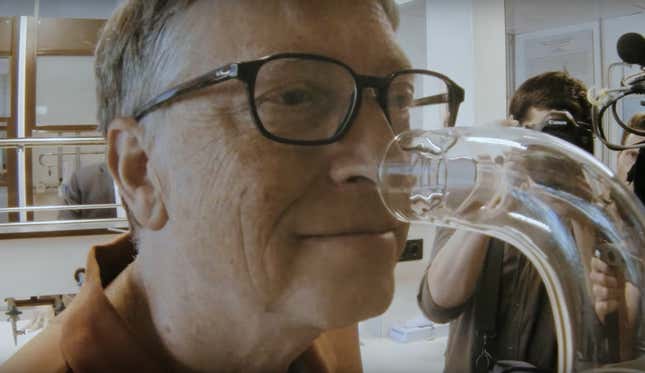Smell is a powerful sense.
That’s why the Bill & Melinda Gates Foundation has partnered with with a group of scientists at Firmenich, a 120-year-old perfume and flavor company based in Geneva, Switzerland. Firmenich makes Romance by Ralph Lauren. And now, it also makes a fragrance that smells, quite literally, like shit.
Bill Gates, who is on a mission to improve global sanitation for the 3 billion people suffering without it, smelled the terrible stench on a trip to Geneva. Then he smelled something else: the same poop fragrance, but combined with other smells selected to block the olfactory receptors that allowed him to detect that first smell of shit. “Instead of stinky sewage, sweat, and ripe cheese, I sniffed a pleasant floral scent,” Gates writes in his blog Nov. 16.
“The approach is similar to noise-canceling headphones which many people use to block out jet engine noise on flights,” Gates writes. In that technology:
“Electronics in the headsets create a sound wave that is 180 degrees out of phase with the ambient noise that needs to be blocked. This wave cancels unpleasant sounds and allows you to enjoy peace and quiet. Likewise, the ingredients in the fragrances developed by Firmenich inhibit the activation of the olfactory receptors sensitive to malodors. By blocking the receptors, our brains do not perceive the bad smells.”

The new odor-blocking fragrance may help fix a massive problem in poor areas across the world where lack of sanitation means people defecate outdoors. One billion people globally are without toilets, Gates writes, and even building them doesn’t help because the stink, especially coming from pit latrines, is so bad that “people continue to relieve themselves in the open where air is fresher,” Gates writes.
And no wonder: Researchers note that the receptors in the nose, unlike other sources of sensation, have direct connections (called “axons”) that terminate in the brain. Smell is one of the oldest senses, and is crucial to understanding the world around us—particularly to identifying things that are dangerous or might make us sick, like the smoke from a house fire, or a rotten piece of food.
Firmenich scientists traveled to areas where sanitation is particularly bad to collect samples, to ensure they’re definitely working to cancel out the awful stench. The company received a $6.3 million grant from Gates’s foundation in 2013.
Our noses have 350 olfactory sensors, only a few of which detect noxious smells. If people are going to use the facilities, maybe odor-canceling technology is the answer. It’s not a long term solution—the equivalent of sweeping dust under a rug, Gates notes. But if it changes habits, a fragrant band-aid is better than nothing.
